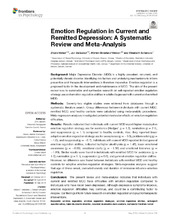| dc.contributor.author | Visted, Endre | |
| dc.contributor.author | Vøllestad, Jon | |
| dc.contributor.author | Nielsen, Morten Birkeland | |
| dc.contributor.author | Schanche, Elisabeth | |
| dc.date.accessioned | 2019-03-29T16:31:02Z | |
| dc.date.available | 2019-03-29T16:31:02Z | |
| dc.date.issued | 2018-05-18 | |
| dc.Published | Visted E, Vøllestad J, Nielsen MB, Schanche E. Emotion regulation in current and remitted depression: A systematic review and meta-analysis. Frontiers in Psychology. 2018;9:756 | eng |
| dc.identifier.issn | 1664-1078 | |
| dc.identifier.uri | https://hdl.handle.net/1956/19264 | |
| dc.description.abstract | Background: Major Depressive Disorder (MDD) is a highly prevalent, recurrent, and potentially chronic disorder. Identifying risk factors and underlying mechanisms to inform preventive and therapeutic interventions is therefore imperative. Emotion regulation is a proposed factor in the development and maintenance of MDD. The aim of the present review was to summarize and synthesize research on self-reported emotion regulation strategy use and emotion regulation abilities in adults diagnosed with current and remitted MDD. Methods: Seventy-two eligible studies were retrieved from databases through a systematic literature search. Group differences between individuals with current MDD, remitted MDD, and healthy controls were calculated using meta-analytic procedures. Meta-regression analyses investigated potential moderator effects on emotion regulation difficulties. Results: Results indicated that individuals with current MDD report higher maladaptive emotion regulation strategy use for avoidance (Hedges' g = 1.3), rumination (g = 2.1), and suppression (g = 1.1) compared to healthy controls. Also, they reported lower adaptive emotion regulation strategy use for acceptance (g = −1.0), problem solving (g = −1.0), and reappraisal (g = −0.7). Individuals with current MDD reported limited general emotion regulation abilities, indicated by higher alexithymia (g = 1.45), lower emotional awareness (g = −0.95), emotional clarity (g = −1.50) and emotional tolerance (g = −1.89). Similar results were found in individuals with remitted MDD for avoidance (g = 1.0), rumination (g = 1.1), suppression (g = 0.6), and general emotion regulation abilities. However, no difference was found between individuals with remitted MDD and healthy controls for adaptive emotion regulation strategies. Meta-regression analyses suggest that age of illness onset, comorbid anxiety and duration of remission influence emotion regulation. Conclusion: The present review and meta-analysis indicates that individuals with current and remitted MDD have difficulties with emotion regulation compared to individuals who have never been depressed. Although depressive symptoms improve, emotion regulation difficulties may continue, and could be a contributing factor to relapse. Our findings inform future research on emotion regulation and psychotherapeutic interventions. | en_US |
| dc.language.iso | eng | eng |
| dc.publisher | Frontiers | eng |
| dc.relation.uri | https://www.frontiersin.org/articles/10.3389/fpsyg.2018.00756/full | |
| dc.rights | Attribution CC BY | eng |
| dc.rights.uri | http://creativecommons.org/licenses/by/4.0/ | eng |
| dc.subject | emotion regulation | eng |
| dc.subject | emotion regulation strategies | eng |
| dc.subject | emotion regulation abilities | eng |
| dc.subject | self-report questionnaires | eng |
| dc.subject | major depressive disorder | eng |
| dc.subject | recurrent depression | eng |
| dc.subject | meta-analysis | eng |
| dc.subject | systematic literature review | eng |
| dc.title | Emotion regulation in current and remitted depression: A systematic review and meta-analysis | eng |
| dc.type | Peer reviewed | |
| dc.type | Journal article | |
| dc.date.updated | 2018-12-18T11:17:27Z | |
| dc.description.version | publishedVersion | |
| dc.rights.holder | Copyright 2018 The Authors | eng |
| dc.identifier.doi | https://doi.org/10.3389/fpsyg.2018.00756 | |
| dc.identifier.cristin | 1586225 | |
| dc.source.journal | Frontiers in Psychology | |

